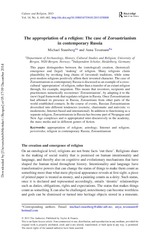The appropriation of a religion: The case of Zoroastrianism in contemporary Russia
Peer reviewed, Journal article
Published version
Date
2013-10-10Metadata
Show full item recordCollections
Original version
https://doi.org/10.1080/14755610.2013.838800Abstract
This paper distinguishes between the (ontological) creation, (historical) emergence and (legal) ‘making’ of religion. Many religions claim plausibility by invoking long chains of (invented) traditions, while some post-modern religions positively affirm their invented character. The case of Zoroastrianism in contemporary Russia is discussed as an example of a cross-cultural ‘appropriation’ of religion, rather than a transfer of an extant religion through, for example, migration. This means that inventors, recipients and practitioners mimetically reconstruct ‘Zoroastrianism’, by adapting it to the (new) legal framework that regulates religion in Russia. Once Zoroastrianism had affirmed its presence in Russia, Zoroastrians from other parts of the world established contacts. In the course of events, Russian Zoroastrianism diversified into different tendencies (esoteric, charismatic and nativistic vs modernistic, Internet-based and international). In addition to functioning as a separate religion, Zoroastrianism in Russia has become part of Neopagan and New Age complexes and is appropriated inter-discursively in the academy, the mass media and in different genres of fiction.
